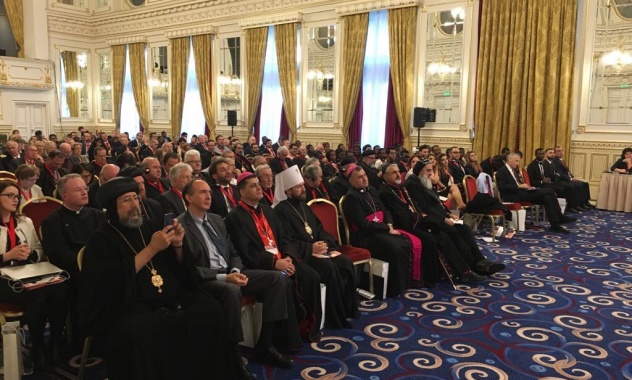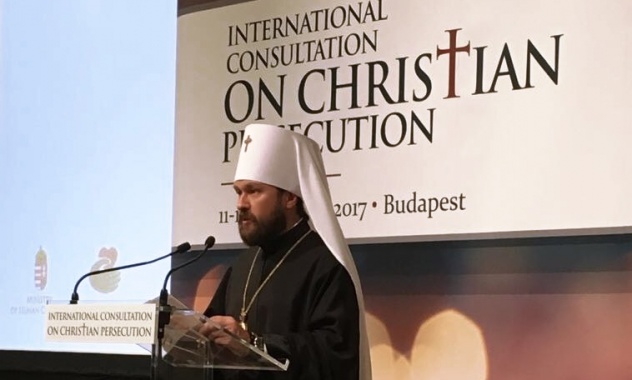Metropolitan Hilarion of Volokolamsk speaks at international conference on persecution of Christians

 On 12 October 2017, an international consultation on “Finding the Appropriate Answers to a Long Neglected Crisis” began its work in Budapest (Hungary). With the blessing of His Holiness Patriarch Kirill of Moscow and All Russia, Metropolitan Hilarion of Volokolamsk, chairman of the Department for External Church Relations, took part in the opening of the conference.
On 12 October 2017, an international consultation on “Finding the Appropriate Answers to a Long Neglected Crisis” began its work in Budapest (Hungary). With the blessing of His Holiness Patriarch Kirill of Moscow and All Russia, Metropolitan Hilarion of Volokolamsk, chairman of the Department for External Church Relations, took part in the opening of the conference.
Among those who attended the meeting, organized with the assistance of Hungary’s Ministry of Human Capacities, were Mr. Viktor Orbán, Prime Minister of Hungary; Patriarch Ignatius Aphrem II of the Syrian Orthodox Church; Patriarch Ignace Joseph III Younan of the Syriac Catholic Church; as well as hierarchs of various Christian Churches. The Moscow Patriarchate was also represented by Archimandrite Philaret (Bulekov), DECR vice-chairman.
The head of the Hungarian government, Viktor Orbán, greeted the participants and guests of the meeting.
During the meeting, Metropolitan Hilarion of Volokolamsk delivered an address, in which he noted the unprecedented scale of persecutions of Christians in the modern-day world. According to the figures cited by the DECR chairman, for the past six years, one and a half million Christians have left Syria, and many churches and monasteries in Syria and Iraq have been destroyed.
As the archpastor emphasized, the further shrinking of the Christian presence in the Middle East will be a genuine catastrophe for civilization, since “the Western civilization has its roots in Christianity, and Christianity itself in its turn originated in the Middle East.”
The DECR chairman drew the attention of all those present to the difficulties facing Christian refugees. He called upon political and state leaders to guarantee a control mechanism over the migration flows.
Metropolitan Hilarion noted that a most important event for Christians of the Middle East was the meeting between Pope Francis and Patriarch Kirill of Moscow and All Russia in Cuba at the beginning of 2016, which “gave a new impulse to the development of inter-confessional interactions among Syria’s Christians and consequently to the strengthening of the Christian presence throughout the Middle East.”
As the Russian hierarch pointed out, within the framework of the joint work with the Roman Catholic Church there was set up a working group which is now compiling a register of destroyed Syrian churches. He also mentioned that a working group on rendering humanitarian aid to the population of Syria had been established under the Commission for International Cooperation of the Presidential Council for Interaction with Religious Organizations. The working group is made up of representatives of Christian, Muslim and Jewish communities of Russia. Thanks to the working group’s activities, two consignments of humanitarian aid have already been delivered to Syria.
The DECR chairman also mentioned the adoption by the UN Human Rights Council in 2015 of the Declaration “Supporting the Human Rights of Christians and Other Communities, particularly in the Middle East,” initiated by Russia, the Vatican and Lebanon with the participation of the Russian Orthodox Church.
In his address, Metropolitan Hilarion emphasized that “the countries of the Christian tradition are called upon to unite their efforts and decisively rebuff the misanthropic ideology of extremism.” “If the Christians of the Middle East feel the economic and political support from the states and peoples of the Christian tradition, then this will strengthen them in their endeavours to remain in their native lands and keep the memory of their forefathers,” the archpastor added.
The Russian hierarch called upon those present to “bear witness before the whole world that Christians have not been abandoned to their arbitrary fate, that there are forces ready to support them and share their witness to the truth and grace which, according to St. John, “came through Jesus Christ” (Jn 1.16).”
To conclude his presentation, Metropolitan Hilarion expressed his hope that the meeting would help find practical ways of supporting the suffering Christians of the Middle East.
The conference will complete its work on October 13. The participants in the meeting will adopt a joint declaration.
Source: Pravoslavie.ru






